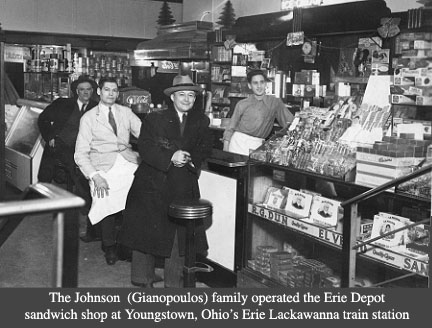|
 The Sons of Doriza pictured above include Gust Talaganis (New Castle, Pennsylvania), the brothers George and Nick Johnson of Youngstown, Ohio and Steve Pedas of Farrell, Pennsylvania.
![[Colonial Market]](../Fam-Colonial Mkt.jpg) The Colonial Market, Broadway Street, Farrell, Pennsylvania

In his book The Greeks in the United States Theodore Saloutos notes that "...the pace for immigration to America was set by the Greeks of the Peloponnesus, the islands, the mainland, and the Ottoman-dominated areas..." Between 1890 and 1910 three-fourths of the male population between the ages of 18 and 35 departed for the United States." "The exodus of the 1890's was precipitated by the decline in the price of currants, the principal export crop. Changes in the commercial policies of France and Russia, the big currant customers, dealt a severe blow to the economy. France formerly purchased between 60,000 and 70,000 tons, or about half the entire Greek crop, to supplement its own harvest that had been destroyed by the phylloxera. But when the French vineyards were replanted and their yield increased, France enacted a protective tariff that literally legislated Greek currants out of the market. Russia adopted a comparable policy. The sharp decline in the demand for currants brought disaster to the Greeks who, in the meantime, had destroyed their olive trees to profit from the active currant trade. Restoring the olive trees was a time-consuming process, for many years are required before they reach a productive stage. The response of many Greeks to this depressed state of affairs was emigration..." Greece did nothing to curb the emigration. "The emigrating Greek did not forget his family responsibilities...In 1905 between 4 and 5 million dollars were received by families in Greece whose relatives were in the United States. The Greek government did not wish to choke the flow of dollars by curbing emigration..."
|